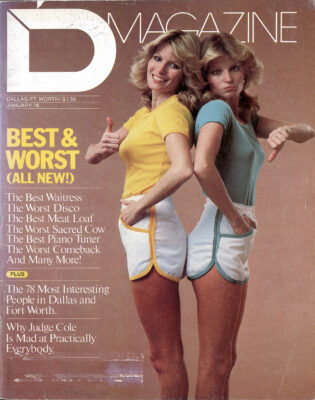For several years Dallas business watchers have been speculating about the financial condition of Trammell Crow’s far-flung real estate empire, which shrank considerably after suffering a severe cash shortage during the 1974-75 recession. Crow’s situation is of interest to a half-dozen major financial institutions which back him, especially Dallas’ First National Bank and Lomas & Nettleton Mortgage Investors. (The other four are Chase Manhattan, the nation’s third largest bank, and the country’s three largest life insurance companies, Prudential, Metropolitan and Equitable.)
Crow is currently closing a deal which greatly reduces his holdings at the 300-acre Park Central complex (LBJ and Central), giving rise to questions about whether he still needs cash. What happens at Park Central has been an interesting indicator of how things in general are going for Crow. Several years ago during the real estate recession a Crow partnership sold 60 percent interest in Park Central to Equitable, simply because the partnership could no longer carry the land debt. The Crow organization originally asked $34 million for 50 percent interest in Park Central. Eventually it accepted $21 million for 60 percent.
Because Crow is not incorporated, the only authoritative source on his hundreds of partnerships is himself. He is an extremely sensitive man who very rarely speaks to the press, feeling that publicity cannot help him but might hurt him. Recently Crow sat down and briefly discussed his latest deal and how his real estate ventures stand today, two years after the recession.
Q. Why are you selling more of Park Central?
A. I’m selling because my partner, Bob Glaze, has retired and wants to withdraw from the joint venture with Equitable. We’re taking Park Central III (the tallest building in the project), its annex and garage, plus Medical City Hospital and a little land. We’ll also wind up with a substantial cash sum. Equitable will own the rest of Park Central. Glaze and I plan to keep our part for the foreseeable future.
Q. Does that mean you personally will make money on Park Central?
A. We’ll come out of it nicely.
Q. The last major article written with your cooperation appeared two years ago in Forbes. It fully detailed your financial squeeze. Is all of that over with?
A. Definitely. We just completed one of our best years ever. We’re still building warehouses and leasing them. Our supply of raw land, which did stand at about ten years, is down to three. Although we haven’t built any apartments in three years, we plan to do so in 1978.
Q. Two years ago your real estate empire was being drained by an enormous negative cashflow which forced you to sell off quite a bit of land and also some warehouses. What is your situation now?
A. Our cash flow is very positive and by the end of 1978, we should be back to the same size as we were in late 1974, before the real estate recession. Of course that recession hurt us, but I’d say we came through it far better than most major developers.
Q. Was there ever a chance that you might go bankrupt?
A. Absolutely not. We’ve sold off many properties and renegotiated many notes, but we’ve managed to meet our commitments with margin to spare.
Q. Are you going to continue in the real estate business, or would you consider some sort of government appointment?
A. I’m 63 now and plan to continue in real estate developing. Today much of my business is actually run by my partners, who are very able.
Q. What about 1978?
A. The general economy may not be as good as 1977. We will be very active, of course, but will move cautiously, being quite sensitive to any economic changes.
Crow has an interesting perspective on his own situation during the last few years. On one hand he plays down rumors suggesting that he was in severe financial straits, but on the other hand, he confirms several incidents which suggest that his cash was very tight indeed.
Buoyed by some major new financial backing, Crow is as optimistic today as ever. In fact, Crow’s only worry seems to be what his partners might think about seeing his remarks in print. “We decided about two years ago not to talk to the press,” Crow said. “My partners might not forgive me for this.” Considering that many of those partners have become quite wealthy as a result of their association with Trammell Crow, forgiveness seems likely.
Get our weekly recap
Brings new meaning to the phrase Sunday Funday. No spam, ever.
Related Articles

Local News
In a Friday Shakeup, 97.1 The Freak Changes Formats and Fires Radio Legend Mike Rhyner
Two reports indicate the demise of The Freak and it's free-flow talk format, and one of its most legendary voices confirmed he had been fired Friday.

Local News
Habitat For Humanity’s New CEO Is a Big Reason Why the Bond Included Housing Dollars
Ashley Brundage is leaving her longtime post at United Way to try and build more houses in more places. Let's hear how she's thinking about her new job.
By Matt Goodman

Sports News
Greg Bibb Pulls Back the Curtain on Dallas Wings Relocation From Arlington to Dallas
The Wings are set to receive $19 million in incentives over the next 15 years; additionally, Bibb expects the team to earn at least $1.5 million in additional ticket revenue per season thanks to the relocation.
By Ben Swanger


